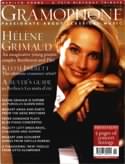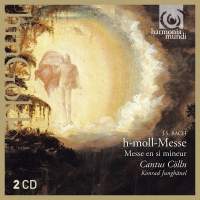Texte paru dans: / Appeared in:
|
|
|
Reviewer: Lindsay Kemp
It is more than 20 years since Joshua Rifkin brought us the 'B minor Madrigal' (Nonesuch 3/83 - nla) , Bach's great church music compendium given one-to-a-part in accordance with the findings of research into the performing resources in the composer's Leipzig. Rifkin's way has not displaced the traditional choral one as the mainstream for Bach's choral music yet, but a few followers have taken up his lead by opting for the smallest ensembles they feel able to get away with and employing a vocal consort which also supplies the soloists. Konrad Junghänel and Cantus Cölln, fielding an orchestra of 19 and a basic one-to-a-part choir with occasional doubling to make a maximum of 10, is now among them. What distinguishes Junghänel from the likes of Andrew Parrott and Jeffrey Thomas (both of whom have also recorded the B minor Mass) or Philip Pickett, Paul McCreesh and the Purcell Quartet, is that his starting-point for consort Bach is neither a choir nor an instrumental ensemble, but a group which began life as a madrigal group and has always carried the consort ethic into even their largest-scale performances. The result is a vocal contingent who know how to blend both with each other and with the instruments, how to create intimacy in surprising places, and how, even in a piece in which text seems relatively unimportant, to find places were words can really count.
Thus, the
opening Kyrie is smooth and serene, the Credo is spared the usual
shout treatment, and the texts of movements such as the 'Kyrie II', 'Qui tollis'
and 'Crucifixus' carry some notable urgency (the latter are stabbed out in
pained anguish). Also on the benefits side, predictably, are greater agility in
the quicker choruses - the Gloria and 'Cum Sancto Spiritu' rattle along
in complete comfort - and clarity in contrapuntal numbers such as the 'Kyrie Il'
and the 'Confiteor' (in which the tenor's plainchant melody, so often buried in
large choruses, is this time unmissable). What listeners may feel is lacking,
however, is a sense of grandeur, and not just that which comes from using larger
forces. The Gloria's inspired switch to duple-time at 'Et in terra pax'
achieves little of its breath-catching potential here, while the Sanctus
and the 'Gratias/Dona nobis pacem' seem indecently hurried and
lightweight, and the 'Et resurrexit' skips by with small sense of excitement and
release. Part of the problem undoubtedly lies in the recording, which leaves the
voices unsympathetically recessed in the overall texture, but even though Andrew
Parrott's 1984 recording with similar-sized forces probably brings his singers a
little too close, it is noticeable that, as an experienced choral conductor,
Parrott is able to bring more shape and drama to the music. Cantus Cölln 's solo
numbers also lack impact; the 'Et in Spiritum Sanctum' and 'Benedictus' are
over-hasty, and for the most part Junghänel's singers make rather characterless
soloists compared to Parrott's - Emma Kirkby among them - whose superiority
carries over into their chorus work as well. Despite a generally efficient
execution, then, this is a rather pallid B minor Mass; too often the whole thing
seems not only physically but emotionally distant. There are also some recording
and/or editing oddities, including a brief but bizarre wash of reverberation in
the Agnus Dei and a volume surge from the trumpets in the 'Dona nobis
pacem'. For sheer tonal beauty and textural clarity Junghänel is outdone by
Rifkin's daddy of one-to-a-parters (even though that one offers occasional
reminders that period instrument expertise has improved since 1983), while for a
bigger vision and more frequent neck-tingling moments it is Parrott who wins
out. |
|
|
|
|
|
Cliquez l'un ou l'autre
bouton pour découvrir bien d'autres critiques de CD |
|




